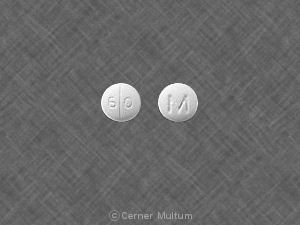Maprotiline Side Effects
Medically reviewed by Drugs.com. Last updated on Nov 10, 2024.
Applies to maprotiline: oral tablet.
Important warnings
This medicine can cause some serious health issues
Some young people have thoughts about suicide when first taking an antidepressant.
Stay alert to changes in your mood or symptoms.
Report any new or worsening symptoms to your doctor.
Get emergency medical help if you have signs of an allergic reaction: hives; difficult breathing; swelling of your face, lips, tongue, or throat.
Report any new or worsening symptoms to your doctor, such as: mood or behavior changes, anxiety, panic attacks, trouble sleeping, or if you feel impulsive, irritable, agitated, hostile, aggressive, restless, hyperactive (mentally or physically), more depressed, or have thoughts about suicide or hurting yourself.
Call your doctor at once if you have:
-
a light-headed feeling, like you might pass out;
-
blurred vision, eye pain or redness, seeing halos around lights;
-
confusion, hallucinations;
-
unusual thoughts or behavior;
-
memory problems;
-
fever, sore throat; or
-
jaundice (yellowing of the skin or eyes).
Common side effects may include:
-
blurred vision;
-
nausea, constipation;
-
feeling nervous, anxious, or agitated;
-
sleep problems (insomnia);
-
dizziness, drowsiness;
-
feeling weak or tired;
-
headache; or
-
tremors.
This is not a complete list of side effects and others may occur. Call your doctor for medical advice about side effects.
See also:
For healthcare professionals
Applies to maprotiline: oral tablet.
General adverse events
The most commonly reported side effects include dry mouth, drowsiness, and dizziness.[Ref]
Gastrointestinal
- Very common (10% or more): Dry mouth (up to 22%)
- Common (1% to 10%): Constipation, nausea
- Rare (0.01% to 0.1%): Vomiting, epigastric distress, diarrhea, bitter taste, abdominal cramps, dysphagia, increased salivation
- Frequency not reported: Sublingual adenitis, black tongue, stomatitis, paralytic ileus[Ref]
Nervous system
- Very common (10% or more): Drowsiness (up to 16%)
- Common (1% to 10%): Dizziness, tremor, headache
- Rare (0.01% to 0.1%): Decreased memory, numbness, tingling, motor hyperactivity, akathisia, EEG alterations, extrapyramidal symptoms, ataxia, dysarthria
- Frequency not reported: Stroke, peripheral neuropathy[Ref]
Psychiatric
- Common (1% to 10%): Nervousness, anxiety, insomnia, agitation
- Rare (0.01% to 0.1%): Confusional states, hallucinations, disorientation, delusions, restlessness, nightmares, hypomania, mania, psychosis exacerbation, feelings of unreality, decreased libido[Ref]
Other
- Common (1% to 10%): Weakness, fatigue
- Rare (0.01% to 0.1%): Tinnitus, drug fever[Ref]
Ocular
- Common (1% to 10%): Blurred vision
- Rare (0.01% to 0.1%): Accommodation disorder, mydriasis[Ref]
Cardiovascular
- Rare (0.01% to 0.1%): Hypotension, hypertension, tachycardia, palpitation, arrhythmia, heart block, syncope, edema
- Frequency not reported: Myocardial infarction[Ref]
Dermatologic
- Rare (0.01% to 0.1%): Skin rash, petechia, itching, photosensitization, excessive perspiration, flushing, alopecia
- Postmarketing reports: Stevens-Johnson syndrome, toxic epidermal necrolysis[Ref]
Genitourinary
- Rare (0.01% to 0.1%): Urinary retention, delayed micturition, impotence, urinary frequency
- Frequency not reported: Breast enlargement (in women), galactorrhea, testicular swelling[Ref]
Hepatic
- Rare (0.01% to 0.1%): Altered liver function, jaundice
- Postmarketing reports: Increased liver enzymes[Ref]
Metabolic
- Rare (0.01% to 0.1%): Elevation/depression of blood sugar levels, weight loss or gain[Ref]
Respiratory
- Rare (0.01% to 0.1%): Nasal congestion
- Postmarketing reports: Interstitial pneumonitis[Ref]
Interstitial pneumonitis was occasionally associated with eosinophilia and increased liver enzymes. However, no clear causal relationship to treatment has been established.[Ref]
Hematologic
- Frequency not reported: Bone marrow depression, agranulocytosis, eosinophilia, purpura, thrombocytopenia[Ref]
Endocrine
- Frequency not reported: Gynecomastia (in men)[Ref]
References
1. (2001) "Product Information. Ludiomil (maprotiline)." Ciba-Geigy Pharmaceuticals
More about maprotiline
- Check interactions
- Compare alternatives
- Reviews (20)
- Drug images
- Dosage information
- During pregnancy
- Drug class: tetracyclic antidepressants
- Breastfeeding
Patient resources
Other brands
Professional resources
Other brands
Related treatment guides
Further information
Maprotiline side effects can vary depending on the individual. Always consult your healthcare provider to ensure the information displayed on this page applies to your personal circumstances.
Note: Medication side effects may be underreported. If you are experiencing side effects that are not listed, submit a report to the FDA by following this guide.

